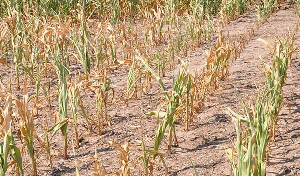A report from the Northern Regional Department of Agriculture reveals that a total 460,784 hectares of farms, representing 60 percent of the region’s cultivated land, have been severely affected by a prolonged dry spell.
The affected farms were planted with various commodities including maize, rice, soybean, millet, cassava, sorghum, cowpea, groundnut and yam.
According to the report, a total of 752,965 farmlands were cultivated by 604,426 farmers comprising 425,715 males and 178,714 females. The worst-hit communities include the Yendi, Savelugu and Gushegu municipalities, as well as Karaga, Mion, Tolon and Nanumba North districts.
The dry spell poses a significant threat to the region’s food security, prompting calls for government intervention to support smallholder farmers in reviving crop production.
Northern Regional Crop Officer, Department of Agriculture, Dauda Abdul Salam highlighted the situation’s during an emergency meeting with stakeholders in the agricultural value chain. The meeting aimed to educate participants on effects of the drought and discuss strategies to mitigate its impact on agriculture in the Northern Region.
The workshop, funded by the Policy Link project of Feed the Future, focused on addressing challenges posed by the drought – which threatens to exacerbate food insecurity in the country.
Mr. Abdul Salam noted that the dry conditions prevented many farmers from preparing their land for cultivation, while others who had already prepared their fields could not sow due to a lack of moisture. Farmers who sowed early, taking advantage of the June rains, experienced severe drought; with crops such as maize and groundnut reaching critical or permanent wilting points.
Northern Regional Director-Department of Agriculture, Hajia Hawa Musah, emphasised the region’s reliance on agriculture, noting that food-crop production dominates the local economy. However, erratic rainfall patterns this year have significantly affected productivity. She mentioned that government has provided fertiliser and financial support to some of the affected farmers.
Hajia Musah called on all stakeholders to collaborate and propose both temporary and long-term solutions that address the challenges posed by climate change. “Our collective efforts will ensure improved agricultural development in the region,” she said.
She encouraged farmers to diversify their income by intensifying livestock and poultry farming.
Paul T. Stephens, Northern and North-East Regional Meteorological Officer, advised farmers to stay informed about weather forecasts from the Ghana Meteorological Agency (GMet) before embarking on their farming activities. He emphasised that timely information on weather patterns can guide farmers on the best time to cultivate and most suitable crops for each season.
He assured stakeholders that GMet’s forecasts are reliable, thanks to modern equipment and technology.
Watch the latest edition of BizTech below:
Ghana’s leading digital news platform, GhanaWeb, in conjunction with the Korle-Bu Teaching Hospital, is embarking on an aggressive campaign which is geared towards ensuring that parliament passes comprehensive legislation to guide organ harvesting, organ donation, and organ transplantation in the country.
Click here to follow the GhanaWeb Business WhatsApp channel
GhanaWeb Business | WhatsApp Channel
https://whatsapp.com
Business News of Wednesday, 11 September 2024
Source: thebftonline.com













